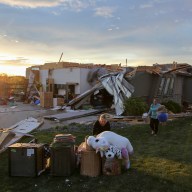VANCOUVER, B.C. – When most people hold their breath, they turn blue.
For the millions of Canadians waiting for the start of the 2010 Winter Olympics on Friday, they’ve been turning red.
The nation has waited for more than 20 years for these Olympics to finally claim a prize denied twice before: an Olympic gold medal on home soil.
In this simple piece of metal are cast the hopes and dreams of the country and by the time the Olympics begin, Canada will be full to bursting with anticipation.
And that’s exactly how the Vancouver Olympic organizing committee wants it.
When they bid for the Games in 2003, said VANOC chief executive officer John Furlong, it was with a very distinct vision.
“We thought we could be a nation builder,” he said. “The Games could be a moment in time for Canada where every Canadian could feel like they had participated in not just watching this and cheering it on, but in actual fact playing a role in helping it be successful.”
The effort put into communicating that during the bid was in part why Vancouver won, said Gerhard Heiberg, the International Olympic Committee member who oversaw the evaluation commission for the bid.
“It’s a question of the people you meet, the presentations they have, the answers to our questions, the confidence they build up in the evaluation team,” Heiberg said in an interview.
“We felt very strongly that on all aspects, John and his team were very, very good.”
The IOC likes to talk a lot about the lasting “legacies” of each Games and there will be some tangible benefits for people in the Vancouver area long after the Olympic flame is extinguished on Feb. 28.
The venues will all be used after the Olympics, whether for their original purposes or for community centres, and legacy funding is in place to help guard against sudden drains on government pocketbooks.
The City of Vancouver also received a new rapid transit line from the airport and final completion of a convention centre that international broadcasters are using for the Games and that many say is the best they’ve ever seen. The highway between Vancouver and Whistler, the site of skiing and sliding competitions, has been upgraded.
To finance their $1.75 billion-budget Games, organizers turned to the well-trod path of getting sponsors to supply much of what they needed, from mattresses in the athletes village to power generators for the venues.
But those kinds of deals and promises of physical legacies are the mainstay of Olympic bids.
While they may rally a region, they do not rally a country.
“It’s not reasonable to think that people in Ontario and Quebec are going to be all that interested in whether the buses get to Whistler on time or the technology works,” said Furlong.
“They’ll be more interested in turning on the television set and seeing a Canadian athlete cross the finish line and hear O Canada the same day. So our goal was to try and to help create that excitement.”
So organizers went province to province, asking them to contribute financially to the Olympics in exchange for being given space and time to promote themselves before a global audience.
They also designed an ambitious, 106-day Olympic flame relay that would come within an hour’s drive of 90 per cent of the population.
“They will all feel they’ve all had a role to play…giving it a push, a nudge, and they feel they’re not watching something that’s being organized by a few Canadians, but watching something they’ve all had a hand in,” said Furlong.
But that still wasn’t enough.
Vancouver organizers decided to venture a step further.
They were going to come out in favour of the home team.
“The prospect of bringing the whole country together would be diminished if we didn’t go into the Games with the prospect of the Canadian team doing very well,” said Furlong.
“We’re the only country in Olympic history not to win a gold medal at home. The focus was to try to not just get that monkey off our back but to really give the country something that they could really feel excited about.”
Together with the federal government and Canadian Olympic Committee officials they ran the ambitious Own the Podium program, a $117 million effort to ensure Canada wins more medals than any other country at these Games.
It was a gutsy move for an organizing committee, whose job in the past has been merely to act as the gracious host for the world and show off a little bit of their country’s charm while they’re at it.
“It’s not something that we recommend an organizing committee do. You have to put resources to that, it costs you money, it costs you resources, it costs you a lot of effort,” said Gilbert Felli, the IOC’s executive director of Games.
“But they have done it, and they have done it very well and we are very pleased about it.”
The goal wasn’t just to change the way the country feels about sport, but about itself, said Dave Cobb, deputy executive director for the organizing committee.
“I think it has become accepted in this country that it’s all right to say we want to be No. 1,” he said. “But to do it in a way that’s not arrogant, not necessarily expected everywhere.”
It definitely wasn’t expected. And the rest of the world has noticed.
“Self-deprecation is the big country’s national art,” opined the British newspaper The Telegraph. “Too nice, too laid-back and too diffident to blow their own trumpet, Canadians have always preferred to leave the shrill blasts of cockiness to their brash, noisy neighbours below the border.”
But, the paper went on to say: “This is Canada’s moment for a sleek sporting makeover.”
For Furlong, whether his team has succeeded the goal of making these Canada’s Games on and off the field of play won’t be known for the next 17 days.
“One of the things that I hope more for really than anything is that this will not be something that ends in March but is the start of something new,” he said.
















